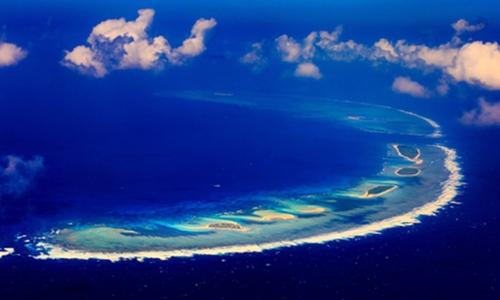China fears no US sanctions over S.China Sea
By Liu Caiyu and Liu Xuanzun Source: Global Times Published: 2020/7/15 23:38:40

Xisha Islands in the South China Sea Photo: VCG
China is not afraid of any sanctions that the US might impose over the South China Sea issue and the US attempt to convince ASEAN countries to confront China and turn itself into a referee in the region will end up in failure, as those countries see no interest in siding with a hegemonic power like the US, Chinese officials and observers said Wednesday.
The comments made after David Stilwell, US Assistant Secretary for East Asian and Pacific Affairs, said Tuesday sanctions against Chinese officials and enterprises involved in what Washington calls "coercion" over the South China Sea would not be off the table. The US Secretary of State Mike Pompeo also asserted on Monday that China's claim to offshore resources in the waters is unlawful.
US officials' recent remarks regarding the South China Sea issue only expose the US plot of creating discord between China and regional countries and destabilizing the region, said Chinese Foreign Ministry Spokesperson Hua Chunying on Wednesday.
If the US wants to stir trouble, let the storm rage on, for which China is not afraid, Hua said.
Analysts said the South China Sea is a like huge pot which stews the interests of many countries, including the Philippines, Vietnam and Malaysia. Creating tensions in the South China Sea by sowing discord between China and ASEAN countries serves the US geopolitical purposes.
The latest comments by US officials seem to instigate relevant claimant countries to carry out resource exploitation activities in the South China Sea region, as a way to provoke China.
But those countries are not stupid. Even the Philippines, a close military ally of the US, has always questioned whether the US could make good on its "security" commitments to the Philippines, Cao Qun, a research fellow from the Center for Maritime Security and Cooperation at the China Institute of International Studies, told the Global Times on Wednesday.
Despite US agitation, the Philippines, a country over-dependent on the international energy market, is more willing to continue resource exploitation within the framework of the China-Philippines oil and gas development cooperation in the South China Sea, Cao said.
It is in the interest of the Philippine government to maintain friendly ties with China, as the Philippines still needs China to explore and develop deep-sea oil and gas since it does not have the technology and financial resources to do so by itself, Cao said.
"China is closely watching Vietnam, as it is a country that mostly likely would take risks against China in exchange for US support in launching unilateral arbitration against China," Chen Xiangmiao, an assistant research fellow at the National Institute for South China Sea Studies, told the Global Times on Wednesday.
A report by Asia Times on May 7 said that Vietnamese officials intend to file an international compulsory arbitration against China over disputes in the South China Sea, following the Philippines.
Vietnam is also seeking the support of the US, including the involvement of US companies, in helping its oil and gas exploration and production, Chen said.
Vietnam holds the rotating presidency of ASEAN this year, which also provides Hanoi a new channel to confront China in maritime disputes, experts said, as the presiding nation could put forward this year's agenda or come up with an initiative.
The other countries are more ambivalent about Washington's foray in the South China Sea. On one hand, they welcome the US as a counterweight to an increasingly powerful China in the South China Sea, but on the other hand they do not want to take sides between the US and China when conflict escalates.
As the biggest beneficiary in South China Sea oil and gas development, Malaysia has always been quiet over conflicts in the South China Sea, and is more likely to maintain this attitude and continue its development of oil and gas outside or across the dotted line in the South China Sea, Cao said. The South China Sea oil and gas production accounts for about 70 percent of Malaysia's total oil and gas production, experts said.
The South China Sea is also a flashpoint of military operations. After sending two aircraft carriers for drills earlier this month, the US again sent the guided-missile destroyer USS Ralph Johnson to the Nansha Islands on Tuesday for "freedom of navigation" operations, the US Pacific Fleet announced the same day.
Beijing-based naval expert Li Jie told the Global Times on Wednesday that the US military wants to create trouble in the South China Sea, push for the region's militarization, and turn itself into a referee and apply its hegemony logic to gain an advantage on China.
From the military perspective, the South China Sea connects the Pacific and Indian oceans, and is a crucial strategic corridor for the US Pacific Fleet to deploy troops to the Middle East. So the US military needs to freely transit through the South China Sea if it wants to carry out its global deployment strategy, analysts said, noting that China's rightful military presence in its territories in the region gives the US pressure, so it wants to push China out.
By provoking conflicts in the South China Sea, the US only wants to satisfy its own purpose of maintaining power in the region and contain China. It would bring no real benefits to countries around the South China Sea, especially when the second reading of the Code of Conduct (COC) in the South China Sea is about to finish, Chinese observes said.
The COC in the South China Sea is widely believed to be a solution to prevent conflicts between China and ASEAN nations, which is not what the US would like to see, experts added.
RELATED ARTICLES:
Posted in: DIPLOMACY